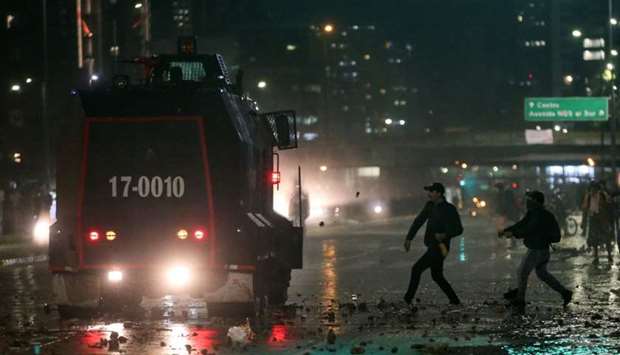Three people were killed following Thursday protest marches across Colombia, the defense minister said, and widespread public transportation problems plagued cities on Friday amid calls for another protest.
More than 250,000 people marched on Thursday to express growing discontent with President Ivan Duque's government, including over rumored economic reforms the president has denied and anger at what protesters say is a lack of government action to stop corruption and the murder of human rights activists.Former leftist presidential candidate Gustavo Petro called for another demonstration on Friday afternoon, urging people to bang pots and pans in Bogota's central square in a traditional expression of protest known as a "cacerolazo." His call is not supported by at least one of the major unions that organized Thursday's march.
The protest coincided with demonstrations in other Latin American countries, including anti-austerity marches in Chile, protests over vote-tampering allegations in Bolivia that led President Evo Morales to resign and inflamed tensions in crisis-hit Nicaragua.
Details surrounding the deaths in Valle del Cauca province were under investigation, Defense Minister Carlos Holmes Trujillo told journalists.
"In the last few hours authorities have confirmed the death of two people in Buenaventura in the midst of disturbances and one more in Candelaria, both municipalities of Valle," he said, adding that a group of people had intended to loot the Viva Buenaventura mall.
"Because of this violent act, the security forces went to confront the event, while being subject to violent aggression with the throwing of rocks and sticks. As a result of the confrontation between vandals and security forces and in events that are the subject of investigation by the attorney general's office, two people were killed," he said.
Blockades continued in four municipalities, Trujillo added. Though the vast majority of marchers participated peacefully, 98 people were arrested, while 122 civilians and 151 members of the security forces were injured, he said.
The authorities were conducting 11 preliminary investigations into misconduct by members of the security forces, Trujillo added, after images circulated on social media showed police treating protesters roughly, including a riot officer kicking a protester in the face.
Commuters in Bogota and other cities faced long delays on Friday as authorities tried to normalize mass transit service. About two dozen of Bogota's bus stations were closed and police used tear gas in a least two parts of the city's working class south in an attempt to clear road blockades.
Bogota's mayor announced a ban on alcohol sales beginning at noon and said vandalism repairs would cost millions of dollars.
Petro's calls for a Friday protest were not supported by one union that helped lead Thursday's marches. The head of the General Work Confederacy (CGT) union on local radio warned against political "opportunism" associated with the marches.
"We'll have to wait a few days to see when we are going to meet with the president," said Julio Roberto Gomez, referring to meetings promised by Duque in a brief speech late on Thursday night.
Meanwhile, the head of the Central Workers Union said his group would participate in the Friday protest.

